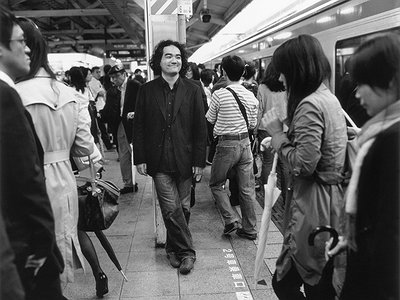Part 2.
How would you define the term “interpretation”? How important is it for you to closely work together with the artists performing your work?
“Interpretation” is the key and reason why music is the ultimate art form, better and stronger than any other art form in the world. Beethoven wrote those notes 200 years ago, and today that work is presented, but it is performed by the people who live today, with their own creative interpretations, which are gelled together by the spirit and treasure of the music. How amazing is this? And unlike “play”, music is abstract, so listeners can interpret the musicians’ interpretation anyway he/she wants, or maybe he/she has no control over how he/she feels, but to receive the music.
Working closely with interpreters is very important to me. Sometimes I even include in the commission contract clause that musicians, whoever I commission, must have several hours of Skype time with me during my composing time. I do this all the time. I video-record the Skype too. I work with musicians all over the world. I write something, I take a screenshot, I email it, musicians will play it, video it with their phone, and then send them back to me. Depending on the piece, sometimes I simulate that recording to see exactly if it will fit the piece or not, especially if what I am asking for is something not traditional playing, like multiphonics or certain extended techniques on the instruments.
The effect of a piece doesn't merely depend on the performance of the musicians, but also on the place it is performed at. How do you see the relationship between location and sound? In how far do you feel the current system of concert halls is still the right one for your music – or for contemporary music in general?
Well, I must say, England where I live and adore living, is one of the worst place for concert halls. There are some good ones, but a lot of major ones sound terrible. I rarely go to concerts to hear music in London. On the other hand, in Japan, there are so many great sounding concert halls, even the rehearsal space for the orchestra sounds better than the concert halls in other countries. Maybe that’s why site-specific performances are rare in Japan as far as I know, and understandable. So many amazing sounding concert halls, why would you play music outside of that?
Having said that, I have always been fascinated with spatial elements, like my work “Fifth Station”, where only a cellist, trumpeter and conductor are on stage and the rest of the ensemble are in the auditorium, surrounding the audience - like a lion hunting his prey. In “Secret Forest”, only the strings are on stage, and the rest of the brass and wind are again in the auditorium surrounding the audience. They are doubling with a total of 7 rain sticks, to create illusion that the audience is in the forest in the rain. The main character is projected by the bassoonist who is in the centre of the auditorium, while 7 musicians in the auditorium perform with rain sticks, and the strings on stage play tremolo with a plectrum.
So in my music “space” is extremely important.
For normal concert hall acoustics, I also edit, mix and master for my commercially released recordings. I can say I prefer drier acoustics. Big church-like acoustics are horrible for my music. All my notes and the details of the harmony of multiphonics and so on are lost in such a “soupy” acoustic.
The role of the composer has always been subject to change. What's your view on the (e.g. political/social/creative) tasks of composers today and how do you try to meet these goals in your work?
Oh boy … well, I always imagine, that we are the creators who first create the 'whisky'. Then commercial musicians (pop musicians) are the ones who bottle this 'whisky', years and years later and then sell them to the public. Maybe by that time the original creators of the whisky might not be alive, but it is a romantic thought that someone in the future might open the bottle and enjoy the whisky. The whisky that absorbed the whole of the situation, how the barrel was stored, maybe it was on island by the sea and sucked up all the smells of the sea, and water which was used to make the whiskey etc.etc. I am not an expert on whisky making (I am an expert drinker – never really been able to afford really expensive ones though), but that’s how I imagine what we do. Contemporary composers are deeply connected to everyday society, even profit-making for someone in the future, another word, the economy of the future. A bit far in the future, but it’s there. In other words, pop musicians of today must thank the serious music composers of the past. Without them, they would not be making the music which the general public finally caught up to accept in their daily life, to make a commercially successful result.
How, do you feel, could contemporary compositions reach the attention of a wider audience?
As I said above, we are reaching the widest audience, but in time. In 50 to 100 years time from when the composer writes the music on paper. You might laugh, but without us, there wouldn’t be a commercial music or audience. No general public can keep listening to exactly the same music over and over. In pop music, after 10 years (or less), the music sounds dated and the public needs “new” songs, new trends. Public taste shifts so quickly, so commercial music composers (of whom I have many as friends) are constantly searching for the next “sound”, for pop, as well as TV music (which is a big market). Usually they take and are influenced by contemporary music from 20 to 50 years ago.
Usually, it is considered that it is the job of the composer to win over an audience. But listening is also an active, rather than just a passive process. How do you see the role of the listener in the musical communication process?
As much as I don’t understand passive listeners, like my parents, I sometimes wish I was passive listener, because then would I suffer less by hearing bad music. I've been thinking recently that it's very rare that people are actually active listeners or even have a good enough ear to be able to listen to the detail of the music. I am talking about people in music professions, even.
Music-sharing sites and -blogs as well as a flood of releases in general are presenting both listeners and artists with challenging questions. What's your view on the value of music today? In what way does the abundance of music change our perception of it?
You mean like stream-listening? Like Youtube or Spotify and so on? Well, I run my own record-label called Minabel to release my own music. So even I invest my time, effort and money to make this happen. But I still would say, that making profit from recorded music is over. Even in the pop world, it is pretty much over. I know so from my collaborations with pop musicians. Do you see all the old rock stars are re-uniting? That is because their royalties have dried up because of this music-sharing.
I think for me, the recordings are like flyers or posters for the concerts, you don’t make people buy the concert flyers, but you spend money to design them. But people do come to hear the live concert, even people who don’t buy the recordings. It’s not because they don’t have 99 pence in their wallet. Look at the restaurants, full of people! They don’t mind to pay over £20 for a meal, with over-priced wine, BUT they won’t pay for 99 pence a track, even for the music they like! It’s a philosophical thing more than anything else. So this means it is a good time for classical music. I LOVE recording. Even then I would say, I write music for a live concert situation. If my effort to release recordings (the point is hoping someone will hear the music I write, from iTunes, or some free streaming) can encourage people to come to a live concert, then that’s nice. Even one more person, that’s enough for me to put enormous amounts of effort into creating a commercial recording.
Composers have traditionally found it hard to secure a living with their art. What are the financial realities you're living with and in which way, do you feel, could they be improved?
Hahaha, ok, I can tell you honestly that I am living off 100% from composing only at the moment. Actually not just me, my wife and my 3 year old daughter too. So our household income is solely from my compositions.
It is incredibly hard, it feels almost impossible to live like this. It gets complicated, even when I finish the scores on time, but whoever the commissioner has not secured their funding so they can’t pay me yet. But then it pains me to waste my time on doing something other than composing, like teaching for instance. Teaching composition is teaching, definitely not composing. As I have already said here, I have always composed in my life, everyday since I was 8 or younger. Whether my parents were wealthy or if I have a partner who has a good income, then it would be so nice that I can just simply write music for free for people who ask me to write. Unlike now, I have so many friends (as well as orchestras and ensembles) whom I love and adore their playing, wanting me to write a piece for them. I wish I could just say, “sure!” and just write for them, rather than spend hours and hours with their agents, my agents, my publishers to try to find the festivals or institutions or private donors (it differs depending on the cultures of the countries you are looking at) to pay me to write for them. This process takes a year to 2 years or even longer, if it ever succeeds.
Visit Dai Fujikura online at www.daifujikura.com






